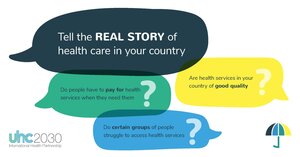Global Learning Laboratory for Quality Universal Health Coverage
Welcome to the Community of Practice for the WHO Global Learning Laboratory (GLL) for Quality Universal Health Coverage (UHC). The GLL is deeply rooted in the five interwoven strategies of the Integrated People Centred Health Services Framework—engaging and empowering people and communities; strengthening governance and accountability; reorienting health services; strengthening coordination of care and creating an enabling environment. The GLL recognizes the key role of people-centred health services in order to achieve the Sustainable Development Goals (SDGs) and UHC.
The GLL highlights the need to focus care on the needs and preferences of people. To this end, the GLL aims to create a safe space to share lessons, experiences and ideas; challenge those ideas and spark innovation on quality within the content of UHC. The GLL is organized around three areas. First, national quality policy and strategy (NQPS) in order to drive quality across all levels of the health ...
